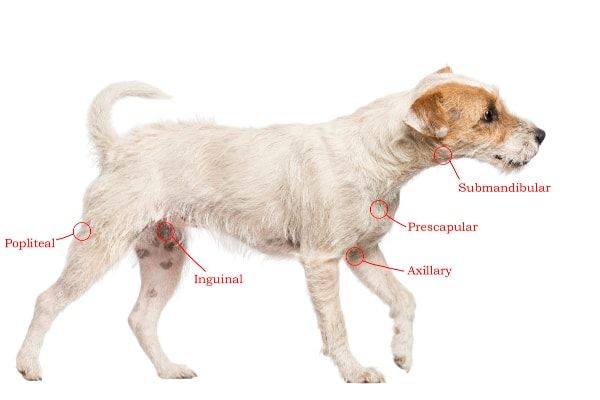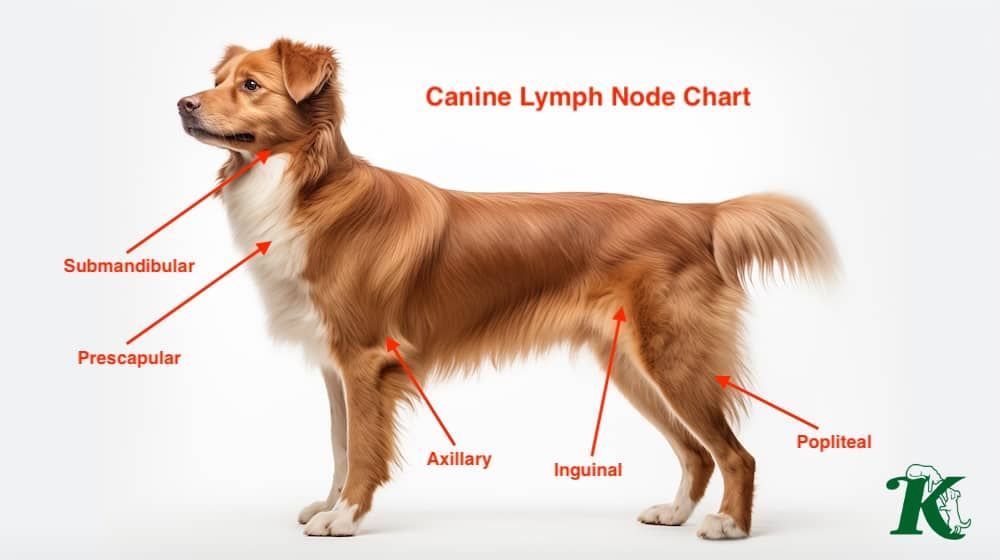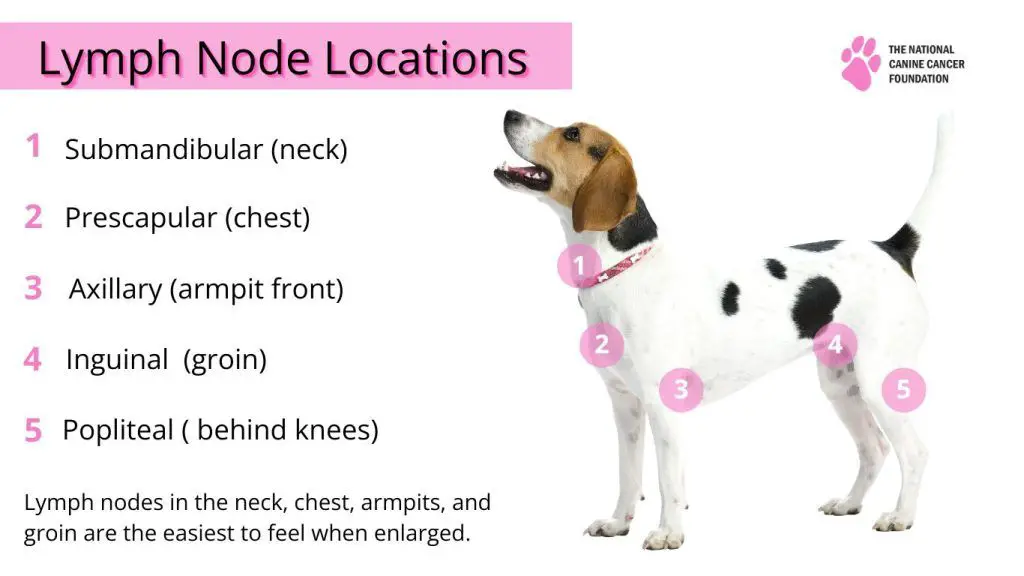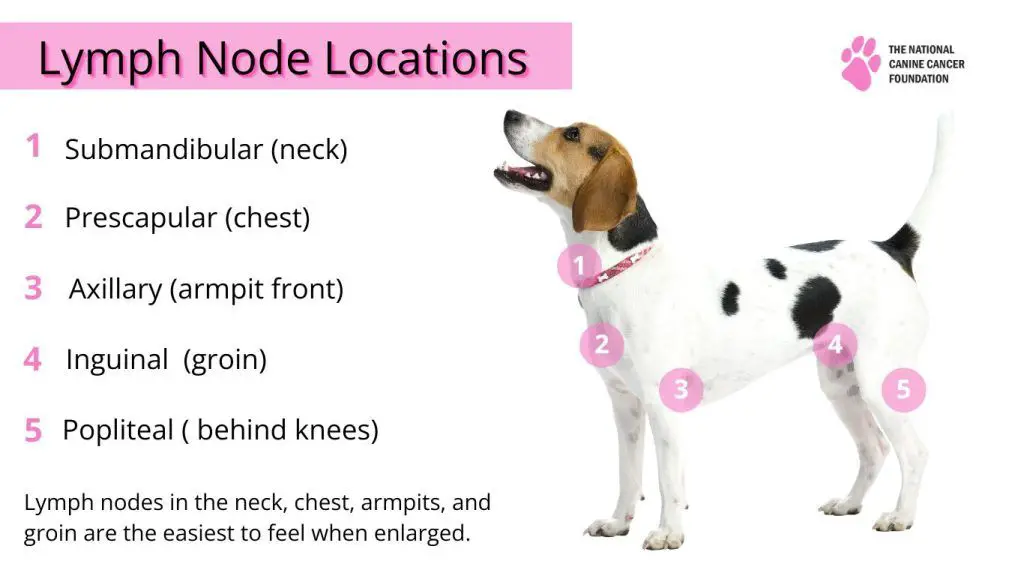What are Lymph Nodes?
Lymph nodes are small, bean-shaped glands located throughout the body of dogs. They are part of the lymphatic system, which helps fight infection and filter waste from the body. The main functions of lymph nodes in dogs include:
- Fighting disease by producing antibodies
- Removing tissue and cell waste
- Moving proteins and white blood cells through the lymphatic system
Lymph nodes act as filters, trapping viruses, bacteria, and other causes of illness before they can spread to other parts of the body. They contain white blood cells that fight infection by attacking and destroying pathogens. When the lymph nodes detect an infection, they swell as the white blood cells multiply to fight it off. Swollen lymph nodes are one sign that the lymphatic system is working to filter out harmful substances and prevent illness.
The major lymph node locations in dogs include the mandibular, prescapular, popliteal, inguinal, axillary, and cervical lymph nodes. Knowing where lymph nodes are located helps determine the cause when they become swollen or inflamed.
Locations of Lymph Nodes in Dogs

Dogs have lymph nodes located throughout their bodies. The most common locations of lymph nodes in dogs include:
- Cervical lymph nodes – located in the neck region
- Prescapular lymph nodes – located in front of the shoulder blades
- Popliteal lymph nodes – located behind the knee joints
- Submandibular lymph nodes – located under the lower jaw
- Precrural lymph nodes – located in front of the stifle joint
- Axillary or armpit lymph nodes
- Inguinal lymph nodes – located in the groin area
- Buccal lymph nodes – located inside the cheek
Lymph nodes are bean-shaped and range in size from a few millimeters to 2 centimeters. They act as filters for foreign substances and help remove toxins from the body. Enlarged or swollen lymph nodes can indicate an infection or other underlying medical condition.
Causes of Swollen Lymph Nodes
There are several potential causes of swollen lymph nodes in dogs, including infections, cancers, and autoimmune diseases. Some of the most common causes include:
Infections
Infections are one of the most frequent reasons for enlarged lymph nodes in dogs. Infections that can lead to swollen lymph nodes include:
- Bacterial infections like abscesses or cellulitis
- Tick-borne diseases like Lyme disease, ehrlichiosis, and Rocky Mountain spotted fever
- Fungal infections such as blastomycosis or histoplasmosis
- Parasitic infections including heartworm disease or toxoplasmosis
The lymph nodes swell as they produce more white blood cells to help fight off the infection.
Cancers
Cancers that start in lymph nodes or spread to them can cause them to enlarge. Lymphoma is one of the most common cancers to affect the lymph nodes in dogs. Other cancers like mast cell tumors and melanoma can also spread to lymph nodes.
Autoimmune Diseases
Some autoimmune diseases where the immune system mistakenly attacks the body’s own tissues can lead to swollen lymph nodes. These include conditions like lupus, rheumatoid arthritis, and immune-mediated polyarthritis.
Symptoms of Swollen Lymph Nodes
The most common symptom of swollen lymph nodes in dogs is the appearance of lumps under the skin where the lymph nodes are located. These lumps may start out small and grow progressively larger over time. The lymph nodes most likely to become swollen and enlarged are those around the neck, jaw, shoulders, and groin area.
Some other symptoms that may accompany swollen lymph nodes in dogs include:

– Lethargy or lack of energy
– Loss of appetite or decreased appetite
– Fever
– Weight loss
– Discharge from the eyes or nose
– Lameness or reluctance to move
Lethargy and loss of appetite are two key symptoms to watch for, as these can indicate your dog is not feeling well. Dogs who are normally energetic may become less active and playful when lymph nodes are swollen and painful. They may also show decreased interest in food or struggle to chew and swallow normally if lymph nodes in the jaw and neck area are affected.
If you notice any lumps, bumps, or swelling around your dog’s lymph nodes accompanied by other symptoms like lethargy and appetite changes, it’s important to make an appointment with your veterinarian for an exam. Swollen lymph nodes can sometimes indicate a serious underlying condition that needs prompt treatment.
Sources:
https://www.petmd.com/dog/conditions/cancer/c_multi_lymphadenopathy
https://www.kingsdale.com/causes-of-swollen-lymph-nodes-in-dogs
Diagnosing Swollen Lymph Nodes
To determine the cause of swollen lymph nodes in dogs, a veterinarian will perform a thorough physical examination, feeling the nodes for abnormalities like increased size, pain, or firmness. They will look for any other symptoms that may point to an underlying cause. The vet will also take the dog’s temperature, as lymphadenopathy can be associated with fever.
Some common diagnostic tests include:
- Biopsy – Removing cells or tissues from the affected lymph node for examination under a microscope. This is often needed to make a definitive diagnosis.
- Imaging – X-rays, ultrasound, or CT scans can help evaluate the size and shape of nodes, detect masses, and look for disease spread.
- Fine needle aspirate – Inserting a needle into a swollen node and drawing out cells for cytology.
- Blood tests – Can reveal elevated white blood cells or antibodies related to certain infections.
According to https://www.thesprucepets.com/swollen-lymph-nodes-in-dogs-5101171, imaging like ultrasound is commonly used to examine lymph nodes and look for abnormalities. Biopsies may be needed for a definitive diagnosis. The vet will choose diagnostic tests based on the clinical signs and suspected underlying cause.
Treatment For Swollen Lymph Nodes
There are various treatment options for swollen lymph nodes in dogs depending on the underlying cause. Some common treatments include:
- Antibiotics – If an infection is causing the swollen lymph nodes, antibiotics may be prescribed to fight the infection. Broad spectrum antibiotics are typically used until cultures determine the specific bacteria involved. Antibiotics are usually given for 2-4 weeks. < cite>https://www.petmd.com/dog/conditions/cancer/c_multi_lymphadenopathy
- Steroids – Steroids like prednisone are used to reduce inflammation and swelling. They help shrink enlarged lymph nodes and relieve discomfort. Steroids may be given short-term or long-term depending on the cause. https://www.kingsdale.com/causes-of-swollen-lymph-nodes-in-dogs
- Surgery – If lymph nodes do not shrink with antibiotic or steroid treatment, surgery may be done to remove them. This is especially true if there are signs of cancer. Surgery can provide a biopsy sample and debulk swollen nodes causing discomfort.
- Chemotherapy – If lymph node swelling is due to cancer like lymphoma, chemotherapy drugs may be used to try to kill cancer cells and shrink lymph nodes. Which chemo drugs are used depends on the type of cancer.
The vet will determine the appropriate treatment course based on examination, diagnostic testing, and the underlying cause of the swollen lymph nodes. Most dogs respond well to treatment and can lead normal lives afterwards.
Home Care for Swollen Lymph Nodes
There are some home care techniques that can help reduce swelling and discomfort from enlarged lymph nodes in dogs. These include:
Warm Compresses
Applying a warm, wet compress to the swollen lymph nodes can help promote drainage and reduce swelling. Use a clean washcloth soaked in warm water and hold it against the affected area for 5-10 minutes, 2-3 times per day. Be careful not to burn the skin.
Massage

Gently massaging the area around the swollen lymph nodes can help move fluid through the lymphatic system. Use small, circular motions and slight pressure. Start below the node and work upwards. Be very gentle, especially if the nodes are painful.[1]
Immune-Boosting Diet
Feeding your dog a diet rich in antioxidants and omega-3 fatty acids can help support immune function. Ingredients like salmon, sardines, blueberries, turmeric, and dark leafy greens have anti-inflammatory effects. Talk to your vet about specific diet recommendations for your dog.
When to See the Vet
Some swelling of the lymph nodes is normal in dogs, but rapid swelling, lethargy, or enlarged multiple nodes are all signs that you should see a veterinarian immediately. According to PetMD.com, “Contact your vet immediately if you notice new swelling in your dog’s lymph nodes.”
Signs that indicate an urgent vet visit include:
- Rapid swelling of the lymph nodes over 24-48 hours
- General lethargy, lack of appetite, or other signs of illness
- Swelling of multiple lymph nodes
- Swollen nodes coupled with a fever
- Discharge, redness, or heat around the swollen lymph node
- Difficulty breathing or swallowing
Some of the potential causes for rapid lymph node swelling that require prompt veterinary care include infections, cancer, immune disorders, and accumulation of abnormal cells. Getting an accurate diagnosis quickly from your vet gives your dog the best chance at effective treatment.
According to Kingsdale Veterinary Hospital, “There are several possible infectious causes of enlarged lymph nodes, including but not limited to: bacterial, tick-borne, fungal, and parasitic infections.” So seeing your vet right away for tests allows them to identify the specific cause and begin targeted treatment as soon as possible.
Don’t wait to see if swollen lymph nodes improve on their own. Rapid swelling or multiple enlarged nodes should be evaluated by your veterinarian within 24 hours whenever possible.
Prognosis for Swollen Lymph Nodes
The prognosis for dogs with swollen lymph nodes depends on the underlying cause and how well the dog responds to treatment. According to PetMD, if the swelling is due to an infection, the prognosis is often good with prompt treatment with antibiotics or antifungals. However, swollen lymph nodes caused by cancer may indicate a guarded prognosis depending on the type, stage, and location of the cancer (https://www.petmd.com/dog/conditions/cancer/c_multi_lymphadenopathy).
Swollen lymph nodes caused by acute inflammation or infection will often return to normal size once the infection is treated and resolved. However, lymph nodes swollen due to chronic conditions may take longer to resolve or may not return to normal size. Dogs who undergo lymph node removal surgery generally recover well, but swelling may persist if an underlying illness remains untreated.
Overall, with appropriate diagnosis and treatment guided by a veterinarian, many dogs with swollen lymph nodes can recover fully and live normal lives. Close monitoring and follow-up care are important, especially for dogs with cancer, to detect recurrence and manage long-term side effects. Prompt veterinary care is key to getting an accurate prognosis and optimal outcome.
Prevention of Swollen Lymph Nodes
There are some steps you can take to help prevent your dog from developing swollen lymph nodes:
Avoid infections – Keep your dog up to date on vaccinations and parasite prevention to help prevent infections that can cause lymph node swelling. Maintain good hygiene and promptly treat any wounds or skin infections that could spread bacteria.
Provide good nutrition – Feed your dog a high-quality commercial dog food and avoid foods with artificial preservatives or ingredients that could suppress their immune system. A healthy diet supports immune function and healing.

Limit toxin exposure – Avoid using lawn chemicals, pesticides, herbicides, and other toxins around your home and yard that your dog could ingest. Exposure to toxins can damage the lymphatic system and cause inflammation.
With proper preventative care and a healthy lifestyle, you can reduce the chances of your dog developing swollen lymph nodes.